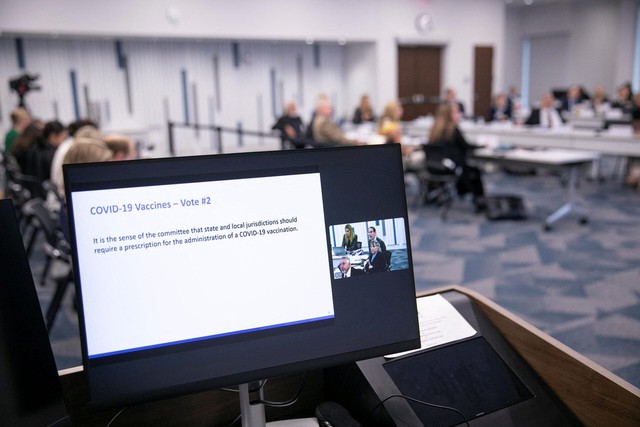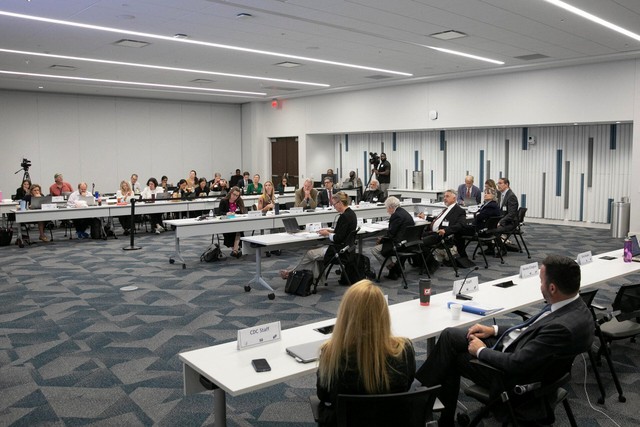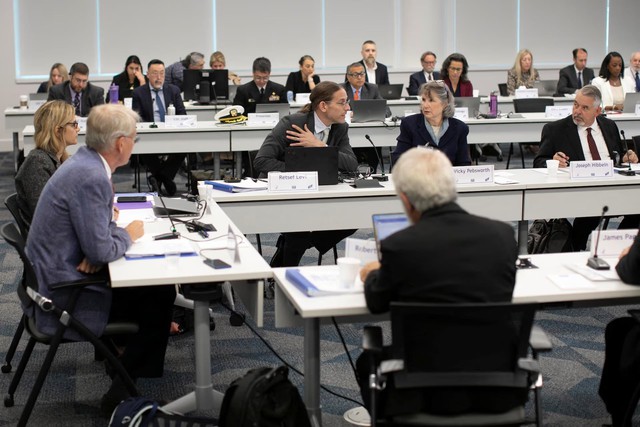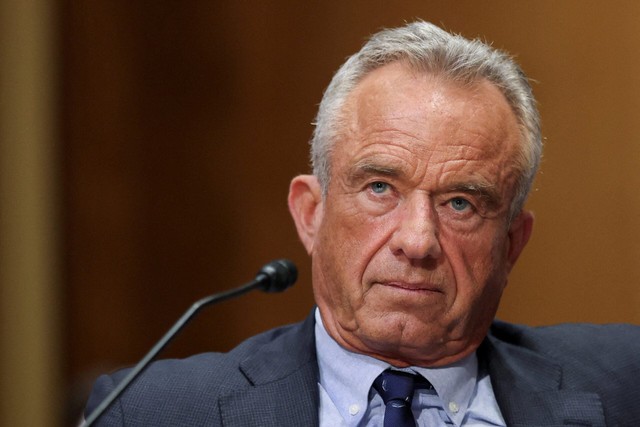
A proposed vote by Massachusetts Institute of Technology professor Retsef Levi is displayed during an Advisory Committee on Immunization Practices (ACIP) meeting at the Centers for Disease Control and Prevention (CDC) in Atlanta, Georgia, U.S., September 19, 2025. Photo: Reuters
The two-day meeting highlighted deep divisions over the future of the U.S. immunization schedules under Kennedy, who has long promoted claims about vaccine harms that run contrary to scientific evidence.
A second COVID vote by the committee, which advises the Centers for Disease Control and Prevention, would have recommended that states and local jurisdictions require a prescription for the COVID vaccine. That vote failed to win a majority.
The committee earlier on Friday abandoned a vote that would have delayed the first hepatitis B vaccine dose for newborns, giving a temporary win to doctors, public health experts and patient advocates who had decried the move.
On Thursday, the panel voted not to recommend giving the combined measles-mumps-rubella-varicella shot to children under 4 years old . But the advisers voted to allow coverage for the shot for these same kids under a U.S. government program that provides free vaccines to children, creating contradictory guidance.
On Friday morning, the committee reversed that vote to align the policy with their recommendation, removing coverage for the shots.
The acting director of the CDC will weigh in on whether to accept the recommendations.

Members of the Advisory Committee on Immunization Practices (ACIP) participate in an Advisory Committee on Immunization Practices (ACIP) meeting at the Centers for Disease Control and Prevention (CDC) in Atlanta, Georgia, U.S., September 19, 2025. Photo: Reuters
Insurance industry says COVID shots covered
Vaccines recommended by the committee, known as the Advisory Committee on Immunization Practices, under shared clinical decision-making are typically covered by U.S. health insurance programs.
AHIP, the insurance industry lobbying group, said it stood by its comment earlier this week that it would cover COVID vaccines through 2026.
Kennedy has been moving at breakneck speed to rewrite U.S. vaccination policy, including dropping recommendations for COVID for pregnant women and children, directing states on limits to their vaccine mandates and cutting funding for mRNA-based research.
The COVID vote by Kennedy's hand-picked vaccine advisory panel followed lengthy presentations, many of which focused on matters of basic science typically taken up by the Food and Drug Administration before approving the shots.

Massachusetts Institute of Technology Professor Retsef Levi speaks during an Advisory Committee on Immunization Practices (ACIP) meeting at the Centers for Disease Control and Prevention (CDC) in Atlanta, Georgia, U.S., September 19, 2025. Photo: Reuters
Several medical experts warned that presentations casting doubt on vaccine safety could lower immunization rates, even though they felt the vote itself had not restricted — and perhaps even expanded — access for some people.
"All the red herrings thrown out today are going to raise doubts, and that will reduce vaccination delivery," said John Grabenstein, former global executive director of medical affairs for vaccines at Merck Vaccines and former senior scientist for the U.S. Department of Defense's Military Vaccine Agency.
"It just throws friction into the system, and every piece of friction reduces vaccinations."
Senator Cassidy had warned Americans
Republican Senator Bill Cassidy, a medical doctor who specializes in liver disease, last week warned that if the committee were to change the hepatitis B recommendation, Americans should not follow their advice.
He made the comments after a HELP committee hearing during which ousted CDC Director Susan Monarez discussed her August firing and said that she had been told that she was expected to approve all committee recommendations. Kennedy had told her that the schedule for children's vaccines would change, she said.
Fiona Havers, a former CDC official who stepped down earlier this year, said she thought the committee would try to revisit the hepatitis B change.
"I think that this was a temporary setback for Kennedy’s agenda. It was clear that there was no scientific basis to move forward with a vote to change the long-standing recommendations," Havers said.
It was not clear how the committee would proceed on the issue going forward. It attributed the delay to inconsistencies in the proposed policies.

U.S. Health and Human Services Secretary Robert F. Kennedy Jr., testifies before a Senate Finance Committee hearing on President Donald Trump's 2026 health care agenda, on Capitol Hill in Washington, D.C., U.S., September 4, 2025. Photo: Reuters
Drugmakers defend COVID shots safety and efficacy
The panel, reconstituted this year by Kennedy, includes several members who have previously raised concerns about routine vaccines or advocated against COVID shots. Five of the members began their terms on Monday.
Members of the COVID vaccine working group raised several potential safety issues that they believe warranted more study. They focused on the persistence of the spike protein in tissue after vaccination, an issue the makers addressed.
Pfizer, which partners with Germany's BioNTech; Moderna; and Sanofi, which partners with Novavax, all defended the safety and effectiveness of their vaccines.
The CDC presented data suggesting COVID-19 vaccination provided additional protection against emergency department visits in children and adults, and hospitalizations and critical illness in adults 65 and older. It said U.S. hospitalization rates from COVID have been the highest for adults 65 and older and infants under 6 months.
"If you just look on the surface of today, despite the pain, it could have been much more damaging," said Dr. Norman Baylor, former director of the FDA's Office of Vaccines Research and Review, who has served as a liaison to the vaccine panel.


Max: 1500 characters
There are no comments yet. Be the first to comment.